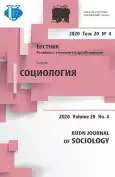Dimensions of time and space in sociology
- Authors: Šubrt J.1, Titarenko L.G.2
-
Affiliations:
- Charles University
- Belarusian State University
- Issue: Vol 20, No 4 (2020)
- Pages: 752-762
- Section: Theory, Methodology and History of Sociological Research
- URL: https://journal-vniispk.ru/2313-2272/article/view/322879
- DOI: https://doi.org/10.22363/2313-2272-2020-20-4-752-762
- ID: 322879
Cite item
Full Text
Abstract
Contemporary sociology has significantly changed the concept of space and time. According to Wallerstein, time and space represent a reality that sociology has long neglected. The situation is different in historical sciences, in which, as White states, the narrative approach prevails, and in historical sociology. The authors focus on time and space as ‘frames’ for the historically oriented explanation. Thus, time can be understood in different ways - as passing, duration, measure, moment appropriate for an action or change. Different forms of time represent different ‘frames’ for interpreting social events. Space is often interpreted in the relational perspective - as an order of relations formed by interacting subjects. The frame, in which we place an event, determines how we see and think about space and time. Reflections on time were significantly influenced by Braudel, who distinguished three levels of historical time. Today, the issue of space and time-space is considered by social geography, which provides some insights for sociology, as Giddens shows, especially when examining modernization and globalization. The sociological concept of time-space was developed by Wallerstein, who distinguished five types of space-time: episodic-geopolitical, conjunctural-ideological, structural, eternal, and transformative. These types of space-time provide different perspectives for the analysis of specific historical events. One of the reasons why Wallerstein places such an emphasis on space-time is that he believes that we are in the transformative time-space, which marks the end of the long structural space-time of the world system. Therefore, we face opposing historical choices and have no certainty, except that every step we take will have serious consequences.
About the authors
J. Šubrt
Charles University
Author for correspondence.
Email: Jiri.Subrt@ff.cuni.cz
доктор философии, заведующий кафедрой исторической социологии факультета гуманитарных наук
U Kříže, 8, Praha 5, 15800, Czech RepublicL. G. Titarenko
Belarusian State University
Email: larissa@bsu.by
доктор социологических наук, профессор кафедры социологии
Prosp. Nezavisimosti, 4, Minsk, 220030, BelarusReferences
- Artemov V.A. A sketch of the sociological concept of social time. Sotsiologicheskie Issledovaniya. 2013; 11 (In Russ.).
- Babayan I.V. Social time: An issue and approaches. Izvestiya Saratovskogo Universiteta. Serija: Sotsiologiya, Politologiya. 2011; 11 (2) (In Russ.).
- Belyaev M.A. On social time in terms of methodology. Vestnik Voronezhskogo Universiteta. Serija: Filosofiya. 2011; 1 (In Russ.).
- Bourdieu P. Sociology of Social Space. Saint Petersburg; 2005 (In Russ.).
- Titarenko L.G. Paradigms and Turns in Contemporary Sociology. Minsk; 2018 (In Russ.).
- Filippov A.F. Sociology of Space. Saint Petersburg; 2008 (In Russ.).
- Šubrt J. The concept of social time in sociology - a promising approach or a theoretical impasse? Sotsiologicheskie Issledovaniya. 2015; 4 (In Russ.).
- Šubrt J. Antinomies, Dilemmas and Discussions in Contemporary Sociological Thought: Essays on Social Theory. Moscow; 2018 (In Russ.).
- Šubrt J. Historical Processes, Social Changes, Modernization in the Sociological Perspective. Moscow; 2017 (In Russ.).
- Alexander J. Contradictions: The uncivilizing pressures of space, time, and function. Soundings. 2000; 16.
- Baert P. Time, Self and Social Being: Temporality Within a Social Context. Avebury; 1992.
- Braudel F.Geschichte und Sozialwissenschaften - Die ‘longue durée’. Hans-Ulrich Wehler (Ed.). Geschichte und Soziologie. Köln; 1972.
- Castells M. The City and the Grassroots: A Cross-cultural Theory of Urban Social Movements. Berkeley; 1983.
- Halbwachs M. Les cadres sociaux de la mémoire. Paris; 1994.
- Harvey D. Social Justice and the City. Athens; 1973.
- Hägerstrand T. Space, time and human conditions. Karlqvist A., Lundqvist L., Snickars F. (Eds.). Dynamic Allocation of Urban Space. Lexington; 1975.
- Giddens A. Die Konstitution der Gesellschaft: Gründzige einer Theorie der Strukturierung. Frankfurt-New York; 1988.
- Giddens A. The Consequences of Modernity. Stanford; 1990.
- Goffman E. Frame Analysis: An Essay on the Organization of Experience. London-New York; 1974.
- Gurvitch G. The Spectrum of Social Time. Dordrecht; 1964.
- Kvasničková A. Náboženstvo ako kolektívna pamäť: prípad Slovenska a Čiech. Bratislava; 2005.
- Lewicka M. On the varieties of people’s relationship with places: Hummon’s typology revised. Environment and Behavior. 2011; 43.
- Lechner F. Simmel on social space. Theory, Culture and Society. 1991; 8.
- Leduc J. Historici a čas: Koncepcie, otázky, diela. Bratislava; 2005.
- Mead G. H. Movements of Thought in the Nineteenth Century. Chicago; 1936.
- Simmel G. The sociology of space. Frisby D., Featherstone M. (Eds.). Simmel on Culture. London; 1997.
- Sokol J. Čas a rytmus. Praha; 1969.
- Sorokin P.A. Sociocultural Causality, Space, Time: A Study of Referential Principles of Sociology and Social Science. New York; 1964.
- Šrubař, I. Sociální jednání a sociální řád. S-obzor: Čtvrtletník pro kritickou sociologii. 1993; 4.
- Sullivan D., Sheridan A.S., Diefendorf J. Simmel’s time-space theory: Implications for experience of modernization and place. Journal of Environmental Psychology. 2015; 41.
- Urry J. Mobilities. Cambridge, MA: Polity Press; 2007.
- Wallerstein I. Der ZeitRaum der Weltsystemanalyse. Bögehold D. (Ed.). Moderne Amerikanische Soziologie. Stuttgart; 2000.
- White H. Metahistory: The Historical Imagination in Nineteenth-Century Europe Baltimore; 1973.
Supplementary files









